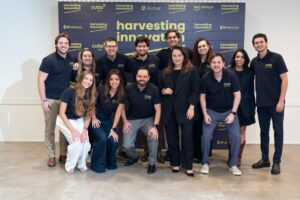Editor’s Note: Hemendra Mathur, a regular AFN guest writer on Indian agritech, is an investor, mentor and board member in many early-stage companies in the food and agriculture sector. He is one of the co-founders of ThinkAg. He works as a venture partner with Bharat Innovation Fund. Views expressed are his own.
The agritech startups in India are pushing the pedal to get to a sizeable scale. The majority of these startups are under three years of age and have pivoted their model multiple times to find their mojo. And the majority of them are revenue positive and EBIDTA negative but with break-evens in sight.
Many tech-enabled supply chain models (both agri-input and output) have crossed an annual turnover of a couple of million dollars while pure data/tech models mostly have revenues of less than a million-dollars, barring a few. Below you can see the different growth curves of these innovation types.
Tech-enabled supply chains are faster to scale initially, and then growth starts tapering unless the companies expand regions, products, and services. In the case of pure-tech models, the gestation time is longer because of multiple tech pivots to figure out matching business models. Once tech models are stabilized (for example, SaaS-based models for remote farm monitoring and image processing platforms for commodity grading) and templatized, they can see an inflection point in scale. This differing nature of growth curve has a direct implication on the nature of ecosystem support as well as the quantum of capital needed in the initial phase.
The good news is that the growth achieved in both types of models as discussed above has happened without burning a hole in the pocket. Cash conservation has been the underlying principal for growth in Indian agritech given the scarcity of risk capital. The thrift culture has helped many Indian agritech startups to survive difficult times with mortality rates under 20%, which in my estimate is much lower than startups in consumer internet and e-commerce.
Many VCs still have doubts about the ability to achieve scale among Indian agritech startups, though they continue to be intrigued and interested in investing in the sector. They can wait but probably cannot ignore the space anymore. At present, there are about half a dozen new investors trying to close their first deal in the sector which augurs well for the ecosystem.
Need to Enable the Ecosystem
The ecosystem needed to enable the growth of startups started with incubation support. CIIE, A-Idea (Naarm), Villgro and ICRISAT have done a creditable job in building the much-needed initial incubation support (mentoring as well as seed capital) in this sector. In the recent past, we saw acceleration programmes from likes of Yes Bank, Gastrotope, etc. gaining momentum. Grand challenge competitions and awards from likes of Ministry of Agriculture, Ministry of HRD, Marico Innovation Foundation, Rabobank, ID Capital, etc. have also opened doors for many new entrepreneurs. This is excellent news for the sector.
However, the entire Indian agritech ecosystem which revolves around the axis of “entrepreneur-investor-incubator-government-corporate,” still has few missing links. I will say “entrepreneur-investor” and “entrepreneur-incubator” links have strengthened significantly over past couple of years. “Entrepreneur – government” collaboration is evolving with some partnerships in the crop insurance and mechanization space. Even “entrepreneur to entrepreneur” connections have shaped up well despite seemingly-competitive business models.
The weakest link is the “entrepreneur – corporate” which needs some targeted effort to strengthen. The Indian agricultural supply chain is dominated by SMEs (with a turnover in most cases of less than $15m) which have limited capital and resources for developing and paying for innovations. Large corporates which have seen some unprecedented growth in the last decade — in sectors such as dairy, animal nutrition, food ingredients, condiments, horticulture to name a few — had many in-house innovations to drive this growth. The segments like frozen foods, yogurts, healthy snacks, dehydrated foods, organic foods grew on the back of some solid research and development efforts put in by the corporates backed by smart branding and strong distribution networks.
However, the majority of innovations came in at the downstream part of the supply chain (processor to retail to consumer) and the upstream part (agri input to farmer to processors/aggregator) remained more or less static without any major innovation because of more complexity and fragmentation in the upstream part of the value chain. Agritech in India is precisely trying to address this gap. Entrepreneur’s understanding of technology along with supply chain orientation can unpeel the complexity to solve multi-dimensional problems of the sector.
ThinkAg: Accelerating Indian Agritech Adoption
Corporates are now finding it a compelling proposition to fill the void or complement their home-grown innovations. Corporates are reworking hierarchies and innovation themes for better engagement with startups. There is a willingness to connect and partner with the right startups.
To accelerate this process, a platform is needed that can curate startups and help them connect with corporates. ThinkAg is one such initiative launched recently (co-founded by Ankur Capital, Ram Kaundinya, Raman Ahuja and Hemendra Mathur), where the objective is to accelerate the Indian agritech startup ecosystem through corporate connections. Also, ThinkAg also provides mentor support, investor connections, research and consultancy with the sole purpose of scaling innovations. The three pillars of ThinkAg are Aglab (market-linked acceleration program to enable rapid scaling), Aginvest (steady pipeline of industry vetted investment ready innovations) and Agconnect (Knowledge dissemination and thought leadership publications).
The startups associated with ThinkAg benefit by getting a ready platform for prototyping innovations, and corporates get a curated set of innovators to work with. ThinkAg is also forging partnerships with many international incubators for providing cross-border opportunities to startups for partnerships and growth.
Bringing Farmers and Innovators Together via FPOs
Another potential partnership which could emerge in time to come will be between startups and FPOs (Farmer Produce Organisations). FPOs in India are at a nascent stage, but they are filling important gaps in the supply chain with a focus on the aggregation of farm produce and linking farmers to markets. There are about 3,000 FPOs in India, but only a few have reached scale. FPOs, in order to be successful, need support in the form of financing, credit rating, capacity building, warehousing, primary processing, etc. Startups are best placed to build tailor-made solutions for FPOs in all these areas. We are already seeing many startups orienting their business models to cater to the needs of FPOs. The handshake between farmer and agritech entrepreneur will create unique win-win collaborative business models, and FPOs have a huge role to play in making this happen.
To conclude, the enabling ecosystem for agritech, which started initially with incubation and acceleration support, is maturing with emerging engagement platforms for corporates, investors, mentors, and FPOs. These platforms will go a long way in catalyzing entrepreneurial activity, corporate partnerships and inflow of investment into the sector.





